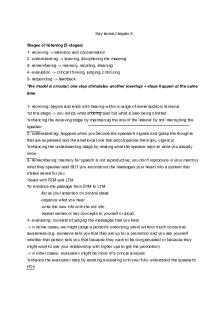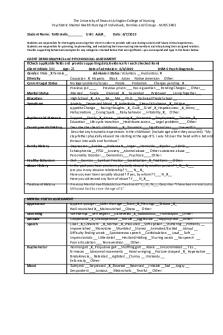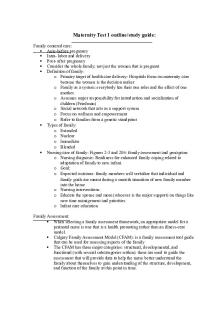Chapter 3 Key Terms - Summary Family Health Care Nursing: Theory Practice and Research PDF

| Title | Chapter 3 Key Terms - Summary Family Health Care Nursing: Theory Practice and Research |
|---|---|
| Course | Family Health |
| Institution | University of Regina |
| Pages | 3 |
| File Size | 75.2 KB |
| File Type | |
| Total Downloads | 100 |
| Total Views | 142 |
Summary
Chapter 3 key terms and critical concepts to review for the exam and the mandatory paper. ...
Description
Chapter 3 Key Terms Bioecological systems theory: Developmental psychologist Urie Bronfenbrenner advanced this theory, which focuses on the interaction and interdependence of humans (as both biological and social entities) with the environment. It combines systems and developmental theory to understand individual and family growth better in the context of the larger environment of society, which is divided into levels. Chronic illness framework: Rolland’s conceptual framework involving multiple factors of chronic illness, which have implications for both the affected individual and family functioning over time. Concepts: Concepts, mental images, or abstract representations of phenomena are building blocks of theory that represent the main ideas the theory expresses, sometimes termed variables. They exist on a continuum from empirical (concrete) to abstract. Examples of concrete concepts are sex and age; examples of abstract concepts are family and health. Conceptual model or framework: The terms model and framework are sometimes used interchangeably to mean a set of interrelated concepts that symbolically represent and convey a mental image of a phenomenon. They are more abstract and more comprehensive than a theory. They integrate concepts into a meaningful configuration or pattern. They are less predictive than a theory and symbolize only that there is a relationship among the concepts in the framework. For example, nursing models are not considered stringent enough to be theories because they are not predictive. Developmental theory: According to developmental theory, human beings have specific tasks at specific periods in their life span, and successful achievement of the tasks at one stage of life leads to happiness and success with later tasks. Failure to achieve tasks leads to unhappiness, disapproval, and difficulty in achieving later tasks. Family assessment and intervention model: Developed by Berkey and Hanson (1991) as an extension and modification of Neuman’s health care systems model to expand the focus from care of an individual to family health nursing care. It focuses specifically on what issues cause family stress and how families react and respond to these stressors. One critical concept is for nurses to help families identify their strengths and build on them to create problem-solving strategies. The Family Systems Stressor-Strength 3 Inventory (FS I) is an assessment and measurement instrument designed according to this model. Family life cycle theory: This is a descriptive developmental theory about the tasks and processes of families. Stages are based on the age of the oldest child of a nuclear family.
Duvall developed the most common family life cycle theory. It has been criticized for not being applicable to nontraditional families. However, similar theories have now been developed for divorced and blended families. Family social science theories: These are a set of theories about how families work that are based in the social science theories, especially sociological theories. Family systems theory: In the family systems theory, families are viewed as an organized whole, and individuals in the family are interdependent and interactive. Every family system has features designed to maintain stability or homeostasis, although these features may be adaptive or maladaptive. At the same time, the family changes constantly in response to stresses and strains from the external environment, as well as from the internal family environment. Theories: Theories are abstract, general ideas subject to rules of organization, composed of concepts and the relationships among concepts. They are selected and organized as abstract representations of phenomena. They are a set of statements that tentatively describe, explain, or predict relationships among concepts. Examples of theories are family systems theory and family development theory.
Critical Concepts .
Theories inform the practice of nursing. Practice informs theory and research. Theory, practice, and research are interactive, and all three are critical to the profession of nursing and family care.
.
The major purpose of theory in family nursing is to provide knowledge and understanding that improve the quality of nursing care of families.
.
By understanding theories and models, nurses are prepared to think more creatively and critically about how health events affect family clients. Theories and models provide different ways of comprehending issues that may be affecting families and offer choices for action.
.
The theoretical and conceptual frameworks and models that provide the foundations for nursing of families have evolved from three major traditions and disciplines: family social
.
No single theory, model, or conceptual framework adequately describes the complex relationships of health events on family structure, function, and process.
.
Nurses who use an integrated theoretical approach build on the strengths of families in creative ways. Nurses who use a singular theoretical approach to working with families limit the possibilities for families they serve. By integrating several theories, nurses acquire different ways to conceptualize problems, thus enhancing thinking about interventions....
Similar Free PDFs

Chapter 3 Key Terms
- 3 Pages

Chapter 3 key terms
- 2 Pages

Key terms chapter 3 pdf
- 5 Pages

Sample Family Nursing Care Plan
- 3 Pages

Chapter 3 summary key
- 22 Pages

Chapter 14 Key Terms
- 2 Pages

Chapter 4 key terms
- 2 Pages
Popular Institutions
- Tinajero National High School - Annex
- Politeknik Caltex Riau
- Yokohama City University
- SGT University
- University of Al-Qadisiyah
- Divine Word College of Vigan
- Techniek College Rotterdam
- Universidade de Santiago
- Universiti Teknologi MARA Cawangan Johor Kampus Pasir Gudang
- Poltekkes Kemenkes Yogyakarta
- Baguio City National High School
- Colegio san marcos
- preparatoria uno
- Centro de Bachillerato Tecnológico Industrial y de Servicios No. 107
- Dalian Maritime University
- Quang Trung Secondary School
- Colegio Tecnológico en Informática
- Corporación Regional de Educación Superior
- Grupo CEDVA
- Dar Al Uloom University
- Centro de Estudios Preuniversitarios de la Universidad Nacional de Ingeniería
- 上智大学
- Aakash International School, Nuna Majara
- San Felipe Neri Catholic School
- Kang Chiao International School - New Taipei City
- Misamis Occidental National High School
- Institución Educativa Escuela Normal Juan Ladrilleros
- Kolehiyo ng Pantukan
- Batanes State College
- Instituto Continental
- Sekolah Menengah Kejuruan Kesehatan Kaltara (Tarakan)
- Colegio de La Inmaculada Concepcion - Cebu








